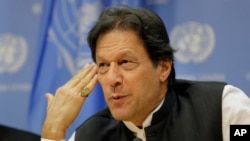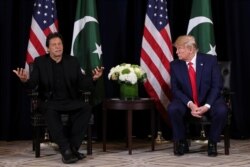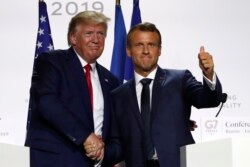Margaret Besheer contributed to this report.
ISLAMABAD - Pakistani Prime Minister Imran Khan revealed Tuesday he is trying and mediating to help de-escalate tensions between the United States and Iran.
Khan spoke to reporters on the sidelines of the United Nations General Assembly, a day after holding bilateral meetings with U.S. President Donald Trump and Iranian President Hassan Rouhani.
"President Trump asked me that if we could de-escalate the situation and maybe come up with another deal. So, I did convey this (to the Iranian president) and yes, we are trying our best. It's an ongoing thing so I can't reveal more than that," Khan said.
The prime minister said he stopped over in Saudi Arabia on the way to New York and discussed with Crown Prince Mohammed bin Salman the regional tensions in the wake of the Sept. 14 strikes on Saudi oil installations. "He also asked me to talk to the Iranian president," Khan disclosed without elaborating further.
Washington blames Iran for the attack and U.S. officials have said they will present evidence to back that up. Tehran denies involvement in the strikes that were claimed by the Iran-aligned Houthis in Yemen, which is fighting a Saudi-led military coalition.
Strained relations between the United States and Iran have deteriorated over the past year since Trump withdrew from a 2015 nuclear deal between Tehran and world powers. The American president reimposed sanctions on Iran, promoting the Shi'ite Muslim nation to gradually reduced its commitments under the deal to limit uranium enrichment activity.
Just when Khan was addressing the news conference at the U.N., Trump separately confirmed to reporters that the Pakistani leader was involved in mediatory efforts to help ease tensions with Iran.
"Well, he'd like to do that, and we have a very good relationship. And there's a chance that that could happen. But, no, I haven't spoken. He actually asked me. He thought it would be a good idea to meet," Trump said before opening his bilateral meeting with President Barharm Salih of Iraq.
Trump noted that French President Emmanuel Macron and German Chancellor Angela Merkel, also were among leaders making diplomatic efforts to bring U.S. and Iranian leaders to the negotiating table. "We'll see what happens. But, so far, we have not agreed to a meeting," he added.
Khan said he was hoping the U.S.-Iran tensions do not escalate into a conflict because Pakistan, which shares nearly a 900-kilometer border with Iran, is already facing economic and security challenges stemming from years of hostilities in neighboring Afghanistan.
Prime Minister Khan said he was also making efforts to help restart peace talks between the U.S. and the Afghan Taliban that President Trump surprisingly called off two weeks ago just when the two sides had come close to signing an agreement.
Islamabad played a key role in bringing the Taliban to the table for talks with American interlocutors.
The fighting has intensified in Afghanistan since the collapse of the U.S.-Taliban peace dialogue, killing hundreds of people, mostly civilians.






